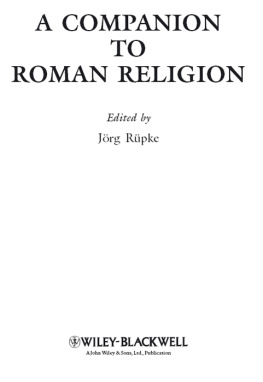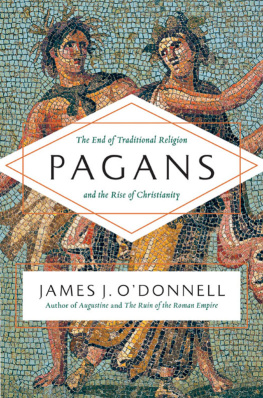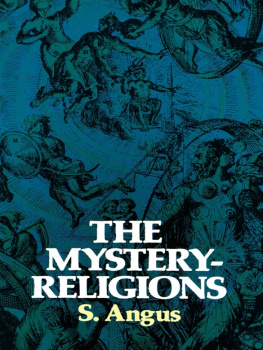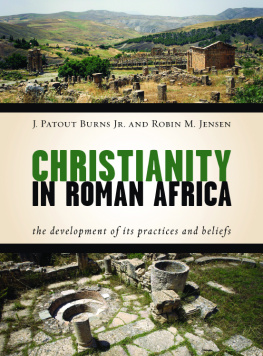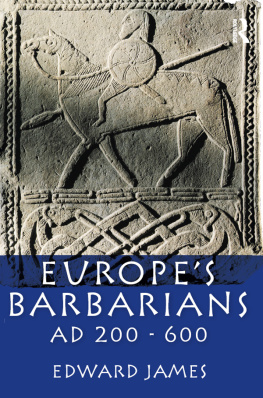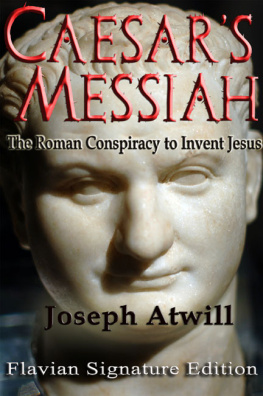CREATING CHRIST
How Roman Emperors Invented Christianity
By James S. Valliant & C. W. Fahy

A Crossroad Press Biography
Digital Edition published by Crossroad Press
Digital Edition Copyright 2016 James S. Valliant & C. W. Fahy
LICENSE NOTES
This eBook is licensed for your personal enjoyment only. This eBook may not be re-sold or given away to other people. If you would like to share this book with another person, please purchase an additional copy for each person you share it with. If youre reading this book and did not purchase it, or it was not purchased for your use only, then you should return to the vendor of your choice and purchase your own copy. Thank you for respecting the hard work of this author.
DISCOVER CROSSROAD PRESS
Visit us online
Check out our blog and
Subscribe to our Newsletter for the latest Crossroad Press News
Find and follow us on Facebook
Join our group at Goodreads

We hope you enjoy this eBook and will seek out other books published by Crossroad Press. We strive to make our eBooks as free of errors as possible, but on occasion some make it into the final product. If you spot any problems, please contact us at and notify us of what you found. Well make the necessary corrections and republish the book. Well also ensure you get the updated version of the eBook.
If youd like to be notified of new Crossroad Press titles when they are published, please send an email to and ask to be added to our mailing list.
If you have a moment, the author would appreciate you taking the time to leave a review for this book at the retailers site where you purchased it.
Thank you for your assistance and your support of the authors published by Crossroad Press.
CREATING CHRIST
Table of Contents
The various modes of worship, which prevailed in the Roman world, were all considered by the people as equally true; by the philosopher, as equally false; and by the magistrate, as equally useful.
-Edward Gibbon, The History of the Decline and Fall of the Roman Empire
Introduction
R eligious fanatics from the Middle East are waging an assault on Western civilization and have just struck a demoralizing blow to the very capital of foreign decadence. Leery of war with an entire people, the West acknowledges only advocates of peace to be true followers of the terrorists religion. Indeed, Western leaders proclaim that their attackers own dogma commands peace.
The year: 66 CE. The civilization under attack: the Roman Empire. And the terrorists: an ancient fanatical sect of Judaism.
Today, religious intolerance is readily associated with Islam. Before the last two or three centuries, however, Christianity was used to justify the same practices: heretics were burned alive, holy inquisitions tortured and executed those suspected of deviant beliefs, priceless books were lost to posterity, pagan temples and art were destroyed, and sacrilegious sex acts were punished with death. For many centuries Europe was plagued with brutal and bloody wars waged decade after decade merely between different sects of Christianity. On a scale of sheer insanity, those atrocities equal any committed in the name of Islam today.
Pre-dating both Christianity and Islam, however, monotheistic Jews in the 1 st Century divided into querulous factions and rebelled against their ruthless Roman conquerors, ultimately igniting the first Jewish War and altering the course of Western Civilization forever.
By the middle of the 1 st Century CE, the Romans had carved out an empire through conquest stretching from Spain to Turkey and from Egypt to the Scottish border. Cosmopolitan, multinational and multiethnic, Rome was, at first, a religiously diverse leviathan that endured through its military skills, no doubt, but also through its political genius.
One way the Roman Empire tried to integrate its many diverse peoples was by actively supporting local religions and cultural traditions. Romans not only allowed but built temples to regional gods and shrines that embraced their various theologies within the hierarchy of official Roman state religion. Both local and Roman deities were venerated togetherinscriptions throughout the Empire record their side-by-side worship, including dedications made by wealthy or political Romans to a number of regional gods.
At the Empires zenith, a wide variety of international deities were worshiped by Romans of all classes and sexeseven in the capitol city of Rome itself. The most remote provinces saw alien cults emerge that had first developed thousands of miles away in some distant part of the Empire, deities such as the Egyptian Isis and Serapis, and Cybele from present day Turkey.
At this time religion and politics were one, and the Romans policy of religious tolerance proved to be a political advantage that helped their empire endure for centuries. The strict monotheism of Judaism, however, would present Roman policy with its greatest challenge.
At first, cultural and religious compromises with the Jews were attempted, such as the granting of special exemptions from the public worship of Roman state deities. However, so strict had the traditions of Jewish monotheism become that any cultural integration was emotionally repulsive pollution to many pious Jews. Meanwhile, many Romans developed an ugly anti-Semitism as they accused Jews of being anti-social haters of all humanity. Violent conflictreligious, cultural, political and militarywas inevitable.
The first Roman census and tax in Judea immediately resulted in the emergence of rebel groups, who the ancient historian Josephus went so far as to label philosophical innovators although they are more properly understood as extreme cultural conservatives within Judaism. They were resisting what was, in their eyes, the corrupting influence of foreign paganism.
Violent conflicts between Jews and Greeks exploded in Alexandria during the reign of the notorious Emperor Caligula during the 1 st Century. In the reign of his successor, Claudius, still more violent disturbances between Romans and messianic Jews erupted in the capitol of Rome itself, as we will see. In the end, two prolonged, bloody wars were fought in Judea in the 1 st and 2 nd Centuries, wars that cost hundreds of thousands of lives, the enslavement of thousands more, the complete and final destruction of the Jewish Temple at Jerusalem and a legal expulsion of the Jews from Judea that extended the Diaspora for two thousand years. Though obscured by the passage of time, the conflict between Romans and Jews was a cultural and military cataclysm that would reverberate through the centuries to this day.
According to an eyewitness historian of the 1 st Century Jewish Revolt against Rome, Flavius Josephushimself a Jewish priest and aristocrat who fought first for the Jewish rebels and then went over to the Roman sidethe underlying causes of the conflict were religious in nature. The sacred literature of the Jews, he explained to the pagan audience of his histories, contained prophecies that a Deliverer would come, a Savior, a world ruler who would emerge from Judea and lead them to victory. At several desperate moments in their long history, Josephus writes in his later works, they had known great leaders, sometimes miracle-workers, who defeated the foreign enemies of the Hebrews and achieved for them the political and cultural independence that their strict form of monotheism required of them.




